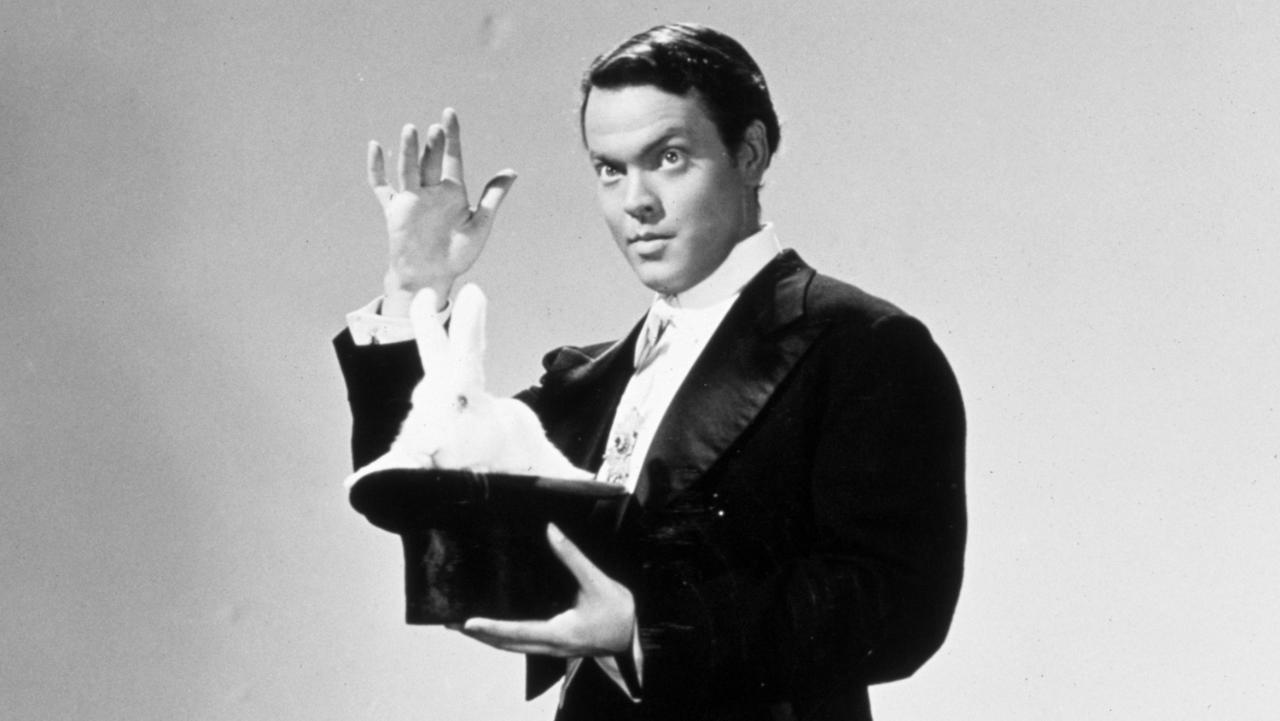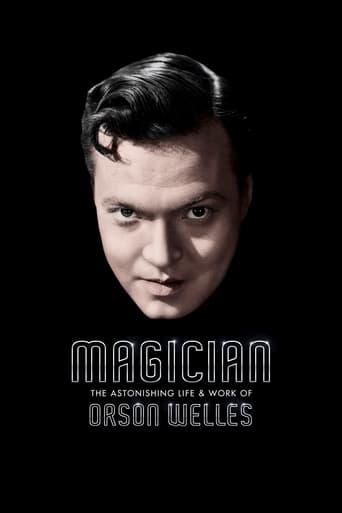

Wonderful character development!
... View MoreFrom my favorite movies..
... View MoreTells a fascinating and unsettling true story, and does so well, without pretending to have all the answers.
... View MoreI think this is a new genre that they're all sort of working their way through it and haven't got all the kinks worked out yet but it's a genre that works for me.
... View More"Magician: The Astonishing Life and Work of Orson Welles" is a documentary from 2014 about the great filmmaker, actor, magician, and personality. I must have seen and read everything there is on Welles, if that's possible, and this particular documentary borrowed heavily from the best there is -- the BBC interview with Welles, which was one of the best things I've ever seen. Of interest here were the photos of him as a young boy, and interviews with Micheál MacLiammóir, Norman Lloyd, comments by Julie Taymor, his daughter Beatrice, and so many others, some of whom I had not seen interviewed before.Welles was, to say the least, a complicated man. He couldn't deal with the studio constraints, but without them, he often floundered. Spielberg was interviewed here, and I remember very well from one of the books on Welles that he went to dinner with Spielberg with the idea that Spielberg could help him find a distributor for one of his movies. When he came home, the interviewer called him, and he said, they only ever want to talk about Kane. Kane was a blessing and a curse. I think some of the people interviewed didn't give him credit for the fact that he was just as talented as he had always been, but the business had become so much tougher.Documentaries about Welles are always worth seeing. He was one of the most charismatic and interesting people who ever lived, and he'd probably tell you that himself. And the people around him seemed to adore him. So really, as much as I have liked other documentaries better, this one is worth seeing too.
... View MoreA documentary on the acclaimed theatre and film director Orson Welles, combining clips from his movies with interview footage and commentaries from many collaborators.This film, which was shown theatrically at various festivals and I caught at my local arts cinema, is informative, well made and provides real insight into Welles' philosophy. This is achieved partly through the terrific footage of Welles himself but also by devoting time to the circumstances of his career. There are the expected plaudits from filmmakers such as Peter Bogdanovich (who knew him very well), Paul Mazursky, and Steven Spielberg, but also firsthand experiences from Norman Lloyd (one of the original Mercury Theatre players and I believe the last one still living), Charlton Heston (Touch Of Evil), Anthony Perkins and Jeanne Moreau (The Trial), as well as Oja Kodar whom Welles lived with for the last twenty years of his life. There are also key contributions from Welles' biographer Simon Callow, who champions the 1966 Chimes At Midnight (and not Citizen Kane) as his masterpiece, as well as noted sound designer/editor Walter Murch. In my view Welles was clearly a fine actor and a brilliant filmmaker, whose intelligence, innovation and gift for his craft is indisputable, but what's more fascinating for me is the career path he took. Many label him a failure; a prodigious talent who peaked in his twenties and then threw it all away. He suffered many indignities, particularly from studio bosses, the Hearst press, critics and bankers throughout his life (New Yorker writer Pauline Kael did a particularly vicious and unfair hatchet job on him in 1971), and when he died in 1985 aged seventy there was muted recognition of his achievements. Conversely I find his biography heroic and trailblazing. Far from getting stuck in Hollywood making formulaic costume dramas, he lived a far richer and more artistically rewarding life. He might have had regrets, when he ran out of money or had to resort to TV shows to retain his status, but all through his life he did great work, often in difficult circumstances where others would give up, and always pushing, learning, adapting, embracing new ideas. This is the true measure of any artist; not how lucrative their work is or how famous they become, and this is why he is held in such regard by so many people who have experienced the frustrations of trying to be a filmmaker with vision and integrity. The movie also illustrates Welles' inestimable influence on cinema, with clips from films as diverse as Woody Allen's Radio Days and Tim Burton's Ed Wood, and some comic interludes, notably a dead-on impression of the great man by John Candy. It's also a real treat for fans of Welles, with footage from some of his lesser known work (such as 1974's F For Fake), and several unfinished projects like his endless production of Don Quixote (a cursed film if ever there was, which Terry Gilliam also tried and failed for years to make). Was Orson Welles a genius ? A mad egocentric ? A pioneer so far ahead of his time ? A charlatan masquerading as an artist ? I think of him as simply a brilliant film director, who poured his soul and originality into his work. To quote Marlene Dietrich, he was some kind of a man.
... View MoreI was moved to review this because the one review on this page completely tore it apart. The way the reviewer wrote made me think that this person had an intense personal dislike of Chuck Workman, for some reason. So, I thought I'd look at this reviewers other reviews. And guess what? Almost all porn. So, let's just stick to the subject at hand: Orson Welles. I first became aware of Welles when I was taking a film class in college. "Citizen Kane" amazed me, not surprisingly. Welles says, in "Magician," that Gregg Toland, the great cinematographer, came to Welles and said that he (Toland) wanted very much to work with Welles on "Kane." Welles said, "Why? I've never directed a film before." And Toland said, "That's why."It was uncharted. Anything was possible. And, indeed, it was.I would encourage any Welles fan to see this. It was well worth it.
... View MoreMAGICIAN is a dud - a less than mediocre run-through of the life and career of the legendary entertainment figure Orson Welles. I caught a theatrical screening Saturday that proved to be a complete waste of time.Contrast this loser with the 2007 documentary SPINE TINGLER!, which informatively and entertainingly profiled schlockmeister William Castle. Unlike Welles, Castle is a mere footnote in film history, but the portrait of him was lively, to the point, and even created an emotional connection (bordering on pathos) when looking at his declining years and premature death - the elements sorely lacking in MAGICIAN.Director Chuck Workman is famous and lauded in some circles (not mine) for his career in compilations (more accurately excerpts) -often responsible for the abbreviated Academy Awards show's highlight reels of great moments in film. I find him to be a master of trivializing, taking works of art ranging from a classic Bugs Bunny cartoon to any number of great feature films and extracting a cute or memorable moment from each, then juxtaposing them together for generally idiotic effect (e.g., a montage of famous screen kisses). I'm old-fashioned: I like to sit through an entire cartoon or movie, even endlessly long ones like BERLIN ALEXANDERPLATZ, THE DECALOGUE or SHOAH. My dreaded "high-brow" satire would be a Saturday Night Live tribute to Jacques Rivette by Workman (or perhaps Tom Schiller, pick your poison) consisting of fleeting clips from his brilliant but notoriously long feature films.And so it is not surprising to me that Workman trivializes Orson Welles' life and career. Most of MAGICIAN consists of old interviews with Welles or other deceased witnesses, ranging from Sydney Pollack to John Houseman. Ken Burns has made a career treating subjects for whom living witnesses are few or nil but through eloquent narration and sometimes readings by talented actors has brought them to life. Where Workman does have a live testimonial the results are - you guessed it- trivial: Welles biographer Simon Callow is a terrific actor and erstwhile director himself, but his comments are unenlightening; Welles' longtime companion Oja Kodar (who I saw give a highly educational talk on Welles decades ago when she presented excerpts of his unfinished films including THE DEEP and THE OTHER SIDE OF THE WIND) is totally wasted in an interview that makes her out to be a flake; Welles experts Peter Bogdanovich and Joe McBride plus recently deceased Paul Mazursky briefly have minimal information to contribute; and Francis Coppola's longtime editor Walter Murch is strictly footnote material discussing the "improvements" (this seems to be a cottage industry) in Welles' TOUCH OF EVIL that have been made by re-editing the Universal re-edited picture. Perhaps meant to insult on purpose, Workman even works in comments by Wolfgang Puck (!) concerning Welles' famous appetite. Thanks a lot, Chuck.To further trivialize matters, Workman insists on including numerous film homages to Welles, such as clips from DAY FOR NIGHT, ED WOOD and the TV movie about KANE starring Liev Schreiber. There is more junk like this than attention to Welles' voluminous screen acting career which gets short shrift other than references to how "in demand" he was. The controversy regarding Welles vs. Herman Mankiewicz in apportioning authorship to CITIZEN KANE (screenwriting-wise) is obfuscated rather than clarified by this worthless documentary.For someone who knows little to nothing about Orson Welles the film hits the familiar clichés -his boy wonder achievements dating back to childhood and growing up in Woodstock; mercurial milestones in theater and radio, triumph and fall in Hollywood and latter years as true independent filmmaker. For me it amounted to a mass of generally misleading information (frequent claims that FALSTAFF not KANE is his true masterpiece) and significant omissions (his Kodar period sloughed off and his long collaboration with the late talented pornographer Gary Graver (more famous as Welles' cameraman) ignored. No need to worry - I suspect another filmmaker, perhaps even Burns or his brother Ric, will conjure up a suitable treatment of the renaissance man Welles. In the meantime MAGICIAN instantly belongs on the scrap heap of bad movies which, to paraphrase Theodore Sturgeon in his famous quote about science fiction, make up 90% of film history ("but then 90% of everything is crud").
... View More